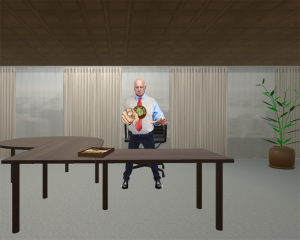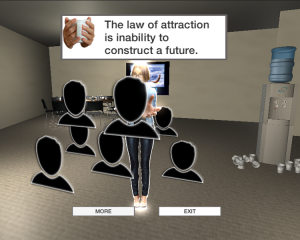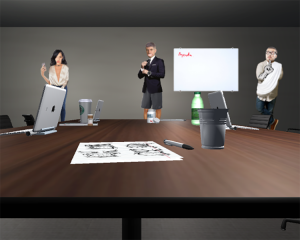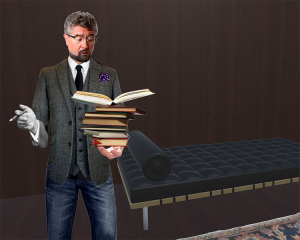We just launched year 2 of the North Carolina Central University/Duke University Digital Humanities Fellows program.  This project is sponsored by the Humanities Writ Large initiative at the John Hope Franklin Humanities Institute, and supports the ongoing effort to connect with and support faculty in Historically Black Colleges and Universities. The new group of Fellows are interested both in project-based teaching opportunities for undergraduates and in establishing archive-oriented research projects. Digital storytelling was a recurring theme for our introductory workhop on August 16. We provided an overview of various Digital Humanities tools and topics and went into greater depth on Omeka and various web tools for timelines, storymaps etc. NCCU will be launching their own Digital Humanities Lab this Fall; we hope our next meeting will be in their new facility.
This project is sponsored by the Humanities Writ Large initiative at the John Hope Franklin Humanities Institute, and supports the ongoing effort to connect with and support faculty in Historically Black Colleges and Universities. The new group of Fellows are interested both in project-based teaching opportunities for undergraduates and in establishing archive-oriented research projects. Digital storytelling was a recurring theme for our introductory workhop on August 16. We provided an overview of various Digital Humanities tools and topics and went into greater depth on Omeka and various web tools for timelines, storymaps etc. NCCU will be launching their own Digital Humanities Lab this Fall; we hope our next meeting will be in their new facility.
SIGGRAPH 2017
July 30-August 3, 2017 was my first SIGGRAPH annual confere nce as Chair of the ACM SIGGRAPH Digital Arts Community. This year we set up an on-site exhibition screen for the Immersive Expressions online show.Our next show, Designing Knowledge, just opened up a CFP. We will continue to share information through our Ning Site and our Facebook Page.
nce as Chair of the ACM SIGGRAPH Digital Arts Community. This year we set up an on-site exhibition screen for the Immersive Expressions online show.Our next show, Designing Knowledge, just opened up a CFP. We will continue to share information through our Ning Site and our Facebook Page.
We also had a wonderful Art Party at the Los Angeles Center for Digital Arts (LACDA).
I also participated as a panelist in a special session on Women in Computer Graphics.
NEH supported Virtual and Augmented Reality for the Digital Humanities
 Duke University has received a grant from the National Endowment for the Humanities for our Summer 2018 Institute for Advanced Topics in Digital Humanities, HT-256969 Virtual and Augmented Reality for the Digital Humanities Institute (V/AR-DHI).
Duke University has received a grant from the National Endowment for the Humanities for our Summer 2018 Institute for Advanced Topics in Digital Humanities, HT-256969 Virtual and Augmented Reality for the Digital Humanities Institute (V/AR-DHI).
PI: VIctoria Szabo, Art, Art History & Visual Studies and Information Science + Studies
Co-PI: Philip Stern, History
V/AR-DHI consists of a two-week summer institute for up to 12 participants to take place in Summer 2018 and to be focused on the application of VR and AR to humanities research, teaching and outreach. The program is co-sponsored by the Digital Humanities Initiative at the John Hope Franklin Humanities Institute, the Wired! Lab for Digital Art History & Visual Culture, the Information Science + Studies Program, the History Department, and the Duke Immersive Virtual Environment (DiVE) in the Pratt School of Engineering.
Video Game Art Reader and Gallery
I’m pleased to have joined the Video Game Art Reader Editorial Board last Fall, and to have been a backer for the recent Kickstarter to support the new Video Game Art Gallery in Chicago. The two initiatives are helping to further the collective conversation around videogames as art, something I have been involved with for the last several years with my Psychasthenia Studio collaborator, new media artist Joyce Rudinsky. Looking forward to seeing the inaugural issue of the journal, and to visiting the new space when I’m next in Chicago!
Psychasthenia 3 at EVA London
I presented the latest art-game in Joyce Rudinsky and my Psychasthenia 3 series, “Dupes,” at EVA London on July 12, 2017.

This version of the game explores the relationship of contemporary HR practices to an increasingly gamified experience of contemporary culture. For the session I presented a walk through of the current game and talked through some of our underlying themes and challenges. We had a fruitful discussion about how to present it as an installation-based work in the coming months.
Visualizing Cities in Barcelona
On July 5, 2017 I gave a talk sponsored by the City Museum of Barcelona and the Autonomous University of Barcelona’s Landscape Intervention and Heritage Management MA Program. The talk, “Smartscapes: Urban Heritage in the Era of the

Digital Society,” explored a range of possible approaches augmented reality offers to urban exploration.
In two days of follow-up workshops on July 6-7, I worked with Master’s students on their project ideas and introduced a variety of digital storytelling tools. We will continue to explore the idea of a Visualizing Barcelona project in the coming years.
NC Jukebox visits Western North Carolina
On April 22, 2017 Terry McKinney and his band hosted a special concert at the Orchard’s at Alta Pass. The NC Jukebox team, led by Trudi Abel from Rubenstein Library and myself, were the featured guests.  Our students presented some of the research they had done on the singers and songs of the collection, sharing an interactive timeline and some of the music clips and information they had gathered. We also set up a small version of the exhibition we had hosted in Rubenstein back at Duke.
Our students presented some of the research they had done on the singers and songs of the collection, sharing an interactive timeline and some of the music clips and information they had gathered. We also set up a small version of the exhibition we had hosted in Rubenstein back at Duke.
In turn, some of the descendants of the singers were in attendance and told stories about their family member’s and their performances. The band played songs we had re-discovered in the archives and people jumped up and danced!
Coding Dürer
I was selected to participate in Coding Dürer: International Hackathon for Art History and Information Science. It was held at Ludwig-Maximilians-Universität München. Munich, Germany from March 13-17, 2017.  My team explored the gap between computer vision technology’s analysis of art images and what curators found in them. Our resulting project, The Rogues Gallery, gave us much better insight into the assumptions built into such systems, and how we might create projects that combine curatoral and computer eye perspectives on art.
My team explored the gap between computer vision technology’s analysis of art images and what curators found in them. Our resulting project, The Rogues Gallery, gave us much better insight into the assumptions built into such systems, and how we might create projects that combine curatoral and computer eye perspectives on art.
Back to Rochester!
I had the pleasurable opportunity to return to my alma mater, the University of Rochester, March 3-5, 2017, to give a talk on “Cultural Approaches to Digital Heritage” as a guest of Mellon Digital Humanities Fellows program, an engaged group of graduate students from various programs.

I also gave an Omeka workshop, demonstrated the Psychasthenia 2 game, talked about the NC Jukebox archive, and had a lot of interesting conversations with faculty, staff, and students. It is great to see how digital scholarship is evolving at the UR and in the English Department.
It was also wonderful to be back in Rush Rhees Library, one of my favorite places on campus, and to visit the Koller-Collins Graduate English Center and Robbins Library, where I first got started working on Digital Humanities projects in the 1990s. I also snuck in trip to the Memorial Art Gallery, and a frigid junket to Lake Ontario. No custard this time of year though!
Digital Durham: Past, Present, Future Rebooted!
Great News! Digital Durham: Past, Present, Future – a reboot of the now “historic” Digital Durham website and project – has been funded by Bass Connections: Information, Society & Culture + the Education and Human Development tracks, along with the Franklin Humanities Institute, for 2017-18! Trudi Abel and I will be upgrading the website, working on a high school AP history model focused on Durham, teaching an intro to DH course themed on Digital Durham where we work with maps, journals, photos, ledgers, etc. etc., and work with the students to develop all sorts of interesting new projects based on existing and new archive content. All of this will be in partnership with Rubenstein Library’s Special Collections and in coordination with the Duke Digital Humanities Initiative work at FHI. I’m also hoping our revamped DD website will serve as a hub for all sort of other interesting “Durham-as-a-Lab” projects, which we know are percolating all around campus. Stay tuned for more….This project will also tie in nicely to the Visualizing Cities work I’ve been doing in Venice and Durham, especially the location-based mobile experience design work… Fun fun fun!













